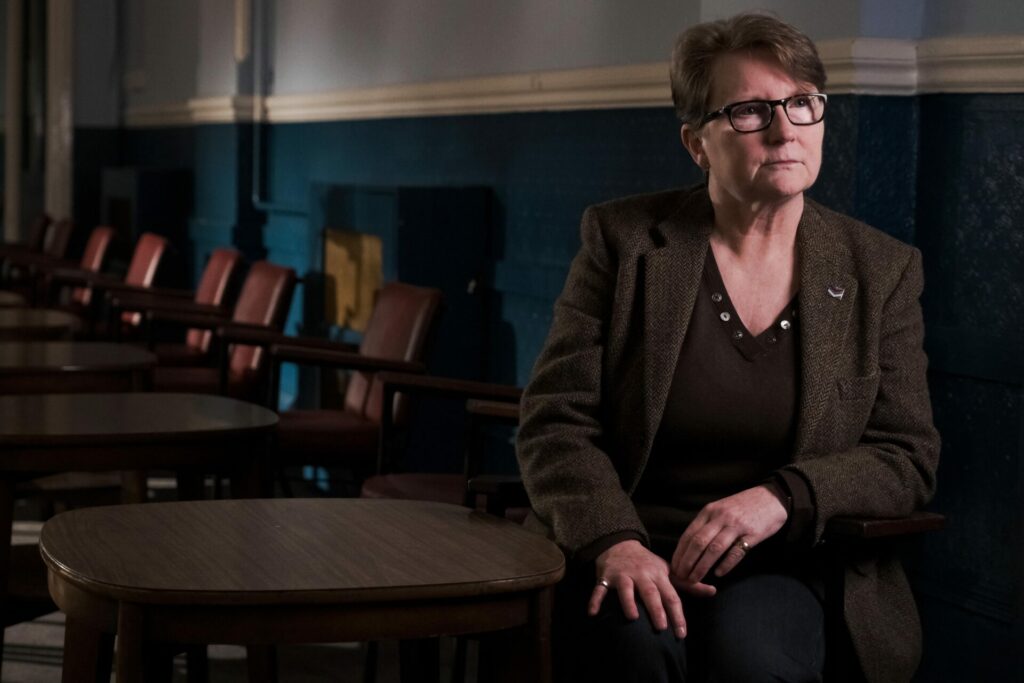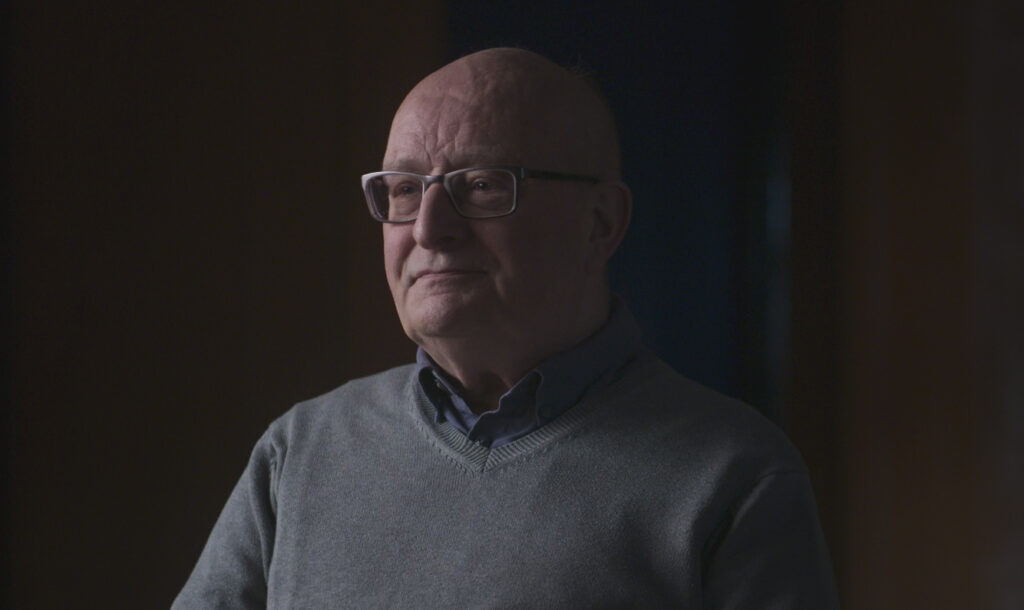Rank Outsiders: Inside the incredible fight from LGBTQ+ military veterans kicked out for their sexuality
Exclusive: “I've come to terms with it, but not happily"
While homosexuality was decriminalised in England and Wales in 1967, it shockingly remained illegal to be gay in the Army, Navy and RAF until 2000.
More than two decades on, Sky documentary Forced Out explores the harrowing ordeals some veterans were dealt and the continued fight to get justice.
Harrowing testimonies from LGBTQ+ veterans delve into how their sexuality meant they faced intrusive investigations, ruthless interrogations and, in some cases, highly unethical physical examinations by military police.
Robert Ely and Elaine Chambers both saw their careers cut short after their LGBTQ+ identities were discovered.
Elaine joined the Queen Alexandra’s Royal Army Nursing Corps as a student nurse in 1982, aged 21. She believed the military would be a place of acceptance. This was what she saw as a teen portrayed in BBC drama Girl, telling the affair between two female army officers, played by Alison Steadman and Myra Frances, who shared an on-screen kiss.
After beginning a romance with a colleague named Sadie, she realised things could not have been more different. She tells Attitude: “I was just delighted and thrilled and a lovesick besotted fool. I wanted to tell everyone, because I felt so happy. I soon learned that I couldn’t.
“From my personal point of view, nobody knew until the day I got arrested”
“A lot of people think, ‘Oh, you joined the army, you must have known it wasn’t allowed.’ Well, actually, I didn’t know it wasn’t allowed. I honestly believed I’d be quite comfortable if I were gay, lesbian, whatever. But I joined and discovered not only is it not allowed, but to even think you might be gay, never mind acting upon it, would make you a criminal.”

Robert joined the army 1966, aged 17, as a musician in the Royal Corps of Signals. “I just kept my secret to myself, throughout my military career. As far as I was concerned, nobody knew.
“I found out years later some guessed. From my personal point of view, nobody knew until the day I got arrested. That’s when the whole thing went, arse about tit. I had no one to talk to. I didn’t know anybody that was gay.”
Whilst working in Hanover, Elaine’s sexuality was discovered. The military police investigated and interrogated her for hours. Following a lengthy investigation in which Elaine admitted her LGBTQ+ identity, she was forced to resign from the army.
Robert was subject to a similar ordeal. Two military police officers knocked on his door in 1986, after reports of his “homosexual activity”. He was later dismissed from the army. The veteran soon fell on hard times and couldn’t pay his mortgage.
This heartbreak turned into an incredible fight for justice. Elaine and Robert met after the latter put an advert in the Pink Paper recounting his story and urging LGBTQ+ veterans who’d been shunned by the army to get in touch.
“Elaine was the very first person that contacted me, late at night,” he shared.
“At our height, we had nearly 3,000 people on our books”
“We’d both been out for a drink that evening. I’d wanted to get a copy of the paper, and I remember sitting in the pub thinking everyone must be looking at me. Of course, nobody knew who I was.
“I came home and I was just getting ready for bed and the phone rang – it was Elaine. We spoke for a good two or three hours into the early hours,” he explained, in what was the first time they’d spoken to someone who’d been through similar circumstances.
“I came up to London to meet her,” he continued. “I was starting to get other people contacting me as well, and we thought it might be a nice idea to try and get people to meet each other.” This was the grassroots of what became Rank Outsiders, an organisation that supported many veterans in the same situation.
Elaine weighed in: “At our height, we had nearly 3,000 people on our books. Bearing in mind that Robert and I met in 1991, pre social media time, everything was being done with sending out letters, making our own fliers, emailing people, people just getting in touch left, right and centre trying to get the word out there,” and they soon got their own telephone set-up helpline courtesy of Stonewall in Central London.

“Meeting Robert was amazing,” she continued. “I’d started properly coming out after I’d been thrown out [the army], I thought it was the right time to come out, because I know who I am.”
Elaine started going to a lesbian discussion group at Gay’s The Word bookshop in London, which concluded with a drink at the now defunct Lesbian Gay Centre. It was after one of these nights she spoke to Robert for the first time after reading his article.
“We knew this was wrong and people needed to know about it”
“His phone number was in his article. I got home, slightly, merry, and thought, ‘shall I, shall I? Okay’. I rang him up late at night, and amazingly, he answered!
“We just talked that first time for probably nearly two hours. To actually talk to somebody who’d been through it, and understood the terminology and everything else was just fantastic.
“We knew this was wrong and people needed to know about it. That’s what kicked it all off.”
The group of brave veterans took on an unprecedented campaign to change the law. They did it – the Ministry of Defence repealed the ban in 2000.
However, in 2023, the lasting effects of the ban are palpable. Robert still struggles today and has never got over what he was made to go through: “I’ve come to terms with it, but not happily. It was a big fight at the time. It took a long, long, long time to get the law changed. We then had to go through a long process of legal process of trying to get compensation for ourselves
“There were a lot of ridiculous amounts [of compensation] being offered, which were just insulting. In the end, like most people, I accepted an offer because I was struggling financially. If I hadn’t been struggling financially, I would have carried on pushing for more, because they completely ruined my career.”
He shares how he believes his career would have turned out if he hadn’t ended up being forced out in his 30s: “I had a fairly good inkling that my career was gonna go right up to 55. I was 36 when I was thrown out. I would have gone to a much better level in the armed forces and that’s painful.
“I’m very proud of daring to put my head above the parapet”
“One other thing is that when the law was changed, it was announced by the government, but there was no apology. The apology was done more recently by a junior minister. From my point of view, it was an ‘under the carpet’ apology.”
Elaine shared: “When I look at myself, I’ve coped really well, I’ve come to terms with it, I’ve moved on. I’ve always had a very positive outlook on life. I often think, even if you can’t see it at the time, things do happen for a reason. All in all, it’s not so bad, so there’s that element.
“But it’s true to say that sometimes when I give talks, because I wrote my book, and things like that, I’ll be talking about things and someone will ask me a question, or I’ll be on a panel, and suddenly, I’ll be talking about something I might have talked about 1,000 times it feels like and my voice is going, my eyes are filling up, and I feel like, ‘Oh my God, why is that still so strong?’
“Maybe I subconsciously push certain things to the back of my mind as a way of coping and moving on or, probably more likely, the intensity of the feelings about what happened is as strong as it ever was, and probably will be to my dying day.”
However, she finished on a very positive note, as we’re reminded yet again of the incredible bravery shown by these ex army veterans. “I’m very proud of my part in getting that wretched ban lifted and getting people to know what was going on. I’m very proud of daring to put my head above the parapet,” she concluded.
Forced Out is on Sky Documentaries and NOW
